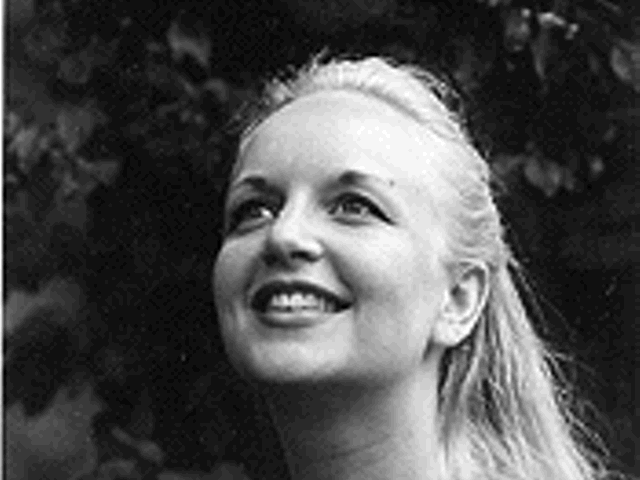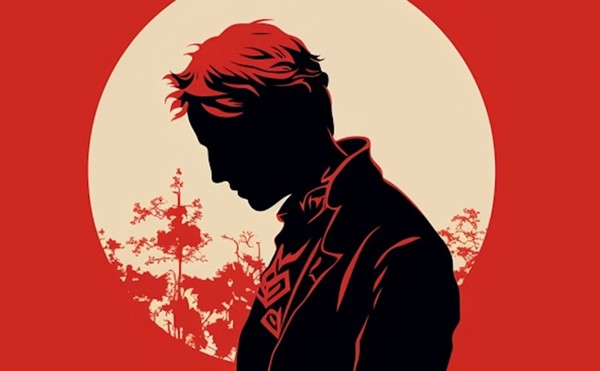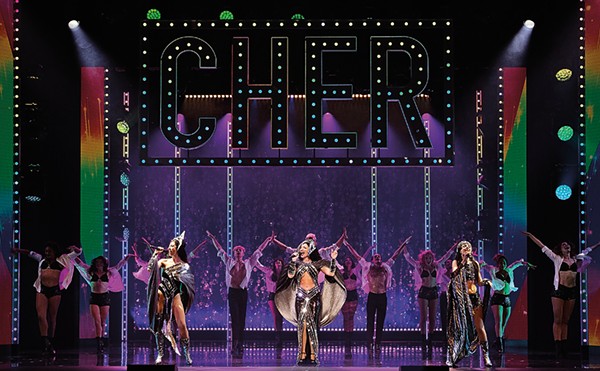Scenic designer Patrick Huber has designed a provocative and versatile set: a graveyard, with a backdrop of wrought-iron gate, and stone walls. As the show begins, the funeral has just ended, and Sebastian (Andrew Richards), a cool and wiry gay neurotic, is at home with his gloom, which has long preceded his mother's demise. At the cemetery, he resents his estranged sister, Bernadette (Michelle Radke), who's spying on him. She's his emotional polar opposite — red-hot with self-loathing and self-awareness. "My mother told me the timbre of my voice gave people a rash," she tells her husband, the addled and tolerant Kip Dixon (David S. Brink), a dentist who sees rotting teeth in place of gravestones.
Of course, Sebastian is in the care of an analyst, Hillary MacMahon (usually Teresa Doggett but ably understudied by Lori A. Kessler in the performance I attended). And despite his isolation, he is cultivating a pen pal, albeit one behind bars, Dylan Taylor Sinclair (Shewan E. Howard). Can his shrink help him as much as the con? Should he come to grips with his depression and inability to find a partner, let alone human contact, after the death of a lover many years earlier?
I regret that I'm making this play sound more conventional than it is — in fact, Captivity is the sort of antic, surreal excursion pioneered by Eugène Ionesco, polished by Wallace Shawn and yearned after by Christopher Durang. Noel Coward would have given his approving Mandarin nod to its staccato dialogue. Characters who start out as dull or conventional gradually shift personae, and Bernadette and Sebastian, who start off completely deranged, undergo transformations that deepen their humanity and even draw them closer together. Theatrical influences on playwright Silver seem to be as much Jacobean as absurdist — this play features a self-mutilation, a seduction-turned-assault and the ghost of mother Miranda proffering stoical advice (she jeers at Sebastian for thinking that "there are no bad people") and the true story of his patrimony.
But the real pleasure in this production — aside from the universally stellar performances by the cast — is the crisply hilarious dialogue. At the graveyard, Bernadette wants to cry about the mother who stifled her and, by God, is going to sob. "I never told her I loved her," she moans. "Yes, you did," replies her husband. "I never meant it," she concludes in a wail.
Usually a metaphor for such screwball exchanges would be a tennis match, but Silver's wordsmithing brings to mind a pinball machine, with multiple bells and whistles in the form of fabulous turns of phrase ("I'm old — my skin is like old wet laundry. I'm all used up," Bernadette observes) or deliciously preposterous images. Director Robert Neblett has staged Captivity at a brisk pace, and he's nurtured his cast into careful and thoughtful performances, even when their very movement is limited like actor Howard's, whose apt depiction of prisoner Dylan is confined to standing stock-still behind the iron bars.
Among the themes explored in this not-to-be-missed production — which runs through next weekend — are the dubious efficacy of therapy, the impossibility (and inevitability) of emotional entanglement, the pleasures of mania, the compulsion that goes with pursuing any art, and the joy of prosody. More unusually, for contemporary drama, each of the main characters experiences an epiphany and then must alter his or her performance to reflect changed circumstances. As the brother/sister act, the superb Richards and Radke have a finesse in their scenes together and separately. Their onstage bickering is sidesplittingly, heartbreakingly hypnotic. As Bernadette's husband, Brink portrays Kip as a baffled and then obsessed dentist-turned-painter (his canvases are the pure white hue no human tooth ever achieves). Kessler and Howard each play double roles and manage to tease subtleties from their dual performances — no easy task, especially given Silver's proclivity for polysyllabic utterance. Musician Margaret Tan's frolicksomely sinister renditions of Beatles hits and classical warhorses on toy instruments provide ingenious entr'acte music. Kudos to the Actors Renaissance Theatre for mounting such an edgy, irreverent and deeply funny work, and making every moment and detail captivating.





